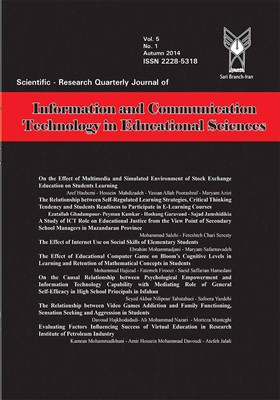تأثیر استفاده از اینترنت بر رشد مهارت های اجتماعی دانشآموزان ابتدایی
الموضوعات :
ابراهیم محمدجانی
1
,
مریم صفرنواده
2
1 - دبیر رسمی آموزش و پرورش، کارشناس ارشد آموزش و پرورش ابتدایی، دانشگاه علامه طباطبایی، تهران، ایران
2 - استادیار گروه برنامه ریزی درسی، دانشگاه علوم پزشکی کرمان، کرمان، ایران
تاريخ الإرسال : 16 الأربعاء , جمادى الثانية, 1435
تاريخ التأكيد : 22 الخميس , ذو الحجة, 1435
تاريخ الإصدار : 08 السبت , محرم, 1436
الکلمات المفتاحية:
اینترنت,
ششم ابتدایی,
مهارت های اجتماعی,
دانش آموزان پسر,
ملخص المقالة :
هدف این پژوهش، بررسی تأثیر استفاده از اینترنت بر رشد مهارتهای اجتماعی دانشآموزان دوره ابتدایی بوده است. این پژوهش در سال تحصیلی 93-1392 به روش شبهتجربی و با استفاده از طرح پیشآزمون و پسآزمون با گروه کنترل انجام شد. جامعه آماری را کل دانشآموزان پسر پایه ششم ابتدایی منطقه سرچهان، به تعداد 185 نفر تشکیل داده است. با استفاده از جدول کرجسی و مورگان تعداد 120 نفر با روش نمونهگیری تصادفی خوشهای به عنوان نمونه انتخاب شدند. ابزار اندازهگیری دادهها، پرسشنامه محققساخته رشد مهارتهای اجتماعی دانشآموزان پایه ششم ابتدایی بود. پایایی آزمون از طریق آلفای کرونباخ 0/87 به دست آمد. روایی ابزار نیز توسط 5 نفر از متخصصان علوم تربیتی و روانشناسی و همچنین، با استفاده از نظرات 20 نفر از آموزگاران و مدیران تأیید شد. دادههای جمعآوری شده با استفاده از آزمون t گروههای مستقل و با استفاده از نرمافزار SPSS تحلیل شد. یافتههای پژوهش حاکی از آن بود که استفاده از اینترنت موجب افزایش رشد مهارتهای اجتماعی دانشآموزان میشود. همچنین، نتایج نشان داد که استفاده از اینترنت موجب افزایش مهارتهای احترام گذاشتن به دیگران، مسؤولیتپذیری، دوستیابی و مشارکت در فعالیتهای گروهی شده است.
المصادر:
Affonso, B., Morrison, M., & Krugman, D. M. (2002). Computers and related technologies and the impact on social interaction. Retrieved from www.iranculture.com (in Persian).
Ahmadi, P., Khademi, E., & Fatahibayat, S. (2009). Effects of new communication technologies (Internet, computer games and satellite) on social education, with a focus on adaptation in the second year high school students of Tehran. New Thoughts on Education, 3, 9-36. (in Persian).
Amirkafi, M. (2004). Sociological pattern of social isolation in Tehran. Unpublished PhD Thesis,Tarbiyat Modares University. (in Persian).
Castells, M. (2001). The Internet galaxy: Reflection on the Internet, business and society. New York. Oxford University Press.
Dehbozorgi, Gh. (1993). The effectiveness of social skills training on the adjustment of chronic schizophrenic patients in Iran. Unpublished Master's Thesis, Iran Medical University. Tehran Psychiatric Institute. (in Persian).
Duran, B. (2002). Impact on the identity of cybernetic space. Unpublished PhD Thesis, Tarbiyat Modares University. (in Persian).
Ebrahimi Ghavam, S. (1994). The relationship between the amount of social development, with emphasis on the types of social support, social skills. Ministry of Education, Institute of Education. (in Persian).
Gresham, F. M., Watson, T. S., & Skinner C. H. (2001). Functional behavioral assessment: Principles, procedures, and future directions. School Psychology Review, 30, 150-172.
Gustavo, M. (2002). Internet impact on the quality of the relationship between adolescent. Retrieved from www.iranculture.com (in Persian).
Harje, O., Saunders, D., & Dixon, D. (2005). Social skills in interpersonal communication (Translated by Khashayar Beygi & Firoozbakht). Tehran: Roshd Publications. (in Persian).
Hasanzadeh, R., Beydokhti, R., & Rezaei, A. (2012). The relationship between academic achievement and personality characteristics of learners with an Internet addiction. Journal of ICT in Education, 3(1), 95-107. (in Persian).
Kestnbaum, M., Robinson, J. P., Neustadtl, A., & Alvarez, A. (2002). Information technology and social time displacement. IT & Society, 1(1), 21-37.
Kiesler, S., Kraut, R., Cummings, J. B., Helgeson,V., & Crawford, A. (2002). Internet evolution and social Impact. IT & Society, 1(1), 120-134.
Kraut, R., Lundmark, V., Patterson, M., Kiesler, S., & Mukapadhyay, T. (1998). Internet paradox: A social technology that reduces social involvement and psychological well-being? Journal of American Psychologist, 53, 1017-1031.
McKenna, K. Y. A., & Bargh, J. A. (2000). Plan 9 from cyberspace: The implication of the internet for personality and social psychology. Personality and Social Psychology Reviw, 4(1), 57-75.
McQuail, D. (2005). McQuails Mass Communication Theory (5th edition). London: Sage Publications.
Mohseni, M., Duran, B., & Sohrabi, M. H. (2006). Effects of Internet use on social isolation of Internet users (Café Net Users in Tehran). Iranian Journal of Sociology, 28, 72-95. (in Persian).
Poorshahriyari, M. (2005). Comparison of depression, social isolation and family connections of users and non-users of the Internet in high school girl students in Tehran. Psychological Studies, 3(2), 49-64. (in Persian)
Sarrafizadeh, A. (2007). Information technology in Organization. Tehran: Mir Publications. (in Persian).
Watt, D., & White, J. M. (1999) Computers and the family life. Comprative Family Studies, 30(1), 1-15.
Wellman, B., Boase, J., & Chen, W. (2002). The network nature of community: Online and offline. Review Quarterly Journal of IT & Society, 1(1), 151-165.
Yamauchi,Y., & Coget, J-F. (2002). Untangling the social impact of the Internet: A larg- scale survey. Retrieved from www.anderson.ucla.edu
Yosefi, F., & Mokhir, M. (2002). Matson evaluation of social skills inventory to measure and compare the performance of boys and girls high school in the scale. Review Quarterly Journal of Applied Psychology, 18(2), 48-57. (in Persian).
Zamani, B., Abedini, Y., & Kalantari, M. (2013). Achievement levels of boys and girls how to use the Internet at school. Review Quarterly Journal of Applied Psychology, 3(27), 85-101. (in Persian).


